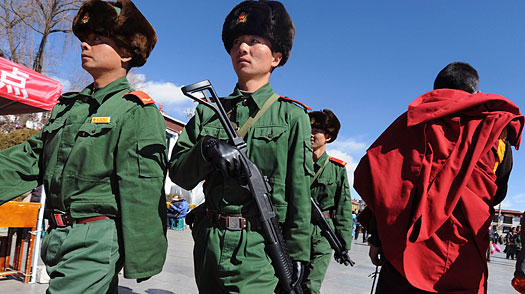Karma Samdup, whose Chinese name is Rukai Gamasangzhu, was sentenced for excavating and robbing ancient tombs, a charge brought and dropped in 1998, his lawyer Pu Zhiqiang said.
Arrested for charges dismissed 12 years ago
“He is innocent. They did not provide any evidence. It is a miscarriage of justice,” Pu told news agency Reuters the same day by telephone.
Karma Samdrup was arrested in Chengdu, Sichuan Province, on January 3. Police informed his wife, Zhenga, several days later that he  was being detained on charges of robbing graves in Yanji County, in the Xinjiang Uighur Autonomous Region, dating back to 1998.
was being detained on charges of robbing graves in Yanji County, in the Xinjiang Uighur Autonomous Region, dating back to 1998.
The police said that Karma Samdrup had acquired a number of artifacts allegedly looted from local archeological sites. The charges had been dropped by the police at the time after Karma Samdrup showed that he had a government license to trade in cultural relics.
Health problems
Later he was taken from southwestern Chengdu city to northwestern Xinjiang region for trial as that was where the charges originated.
The lawyer said that although Karma Samdup mentally was fine, he had been shocked by his client’s appearance.
“He looked terrible. He’s lost a lot of weight in jail and says he was treated terribly,” Pu said.
“If not for his voice, I would not have recognised him,” his wife Zhenga Cuomao told the Associated Press.
She said Samdrup appeared gaunt when he appeared at the Yangqi county courthouse in Xinjiang, the mountainous province neighbouring Tibet.
Prosecutor Kuang Ying on 22 June 2010 denied violence had been used against Samdrup, who founded the Three Rivers Environmental Protection group and pushed for conservation of the source region for the Yangtze, Yellow and Lancang (Mekong) rivers.
Campaign against Tibet intellectuals
Pu said he did not know why the charges had resurfaced after so long.
“I think there are political reasons behind this,” he said, without elaborating.
Court officials could not immediately be reached for comment.
According to the Guardian, the wealthy Tibetan art collector is an unlikely political prisoner. His group has won several awards for its work, including the Earth Prize, which is jointly administered by Friends of the Earth Hong Kong and the Ford motor company.
In 2006, he was named philanthropist of the year by state broadcaster the People´s Republic of China Central Television (CCTV) for “creating harmony between men and nature”.
Samdrup’s trial has been delayed for several weeks amid claims that he is being unfairly punished for lobbying the authorities for the release of his two brothers.
he is being unfairly punished for lobbying the authorities for the release of his two brothers.
His siblings, Rinchen Samdrup and Jigme Namgyal, were arrested last August after their separate environmental protection group – Voluntary Environmental Protection Association of Kham Anchung Senggenamzong – sought to expose officials who hunted endangered animals. Namgyal is serving a 21-month re-education-through-labour sentence for “harming national security.”
He is accused of illegally collecting information about the environment, natural resources and religion, organising petitions, and providing propaganda material for supporters of the Dalai Lama. Rinchen Samdrup is in custody but has not been tried.
According to the International Campaign for Tibet, this may be part of a new campaign against intellectuals.
The Washington-based group said last month that 31 Tibetans are now in prison “after reporting or expressing views, writing poetry or prose, or simply sharing information about Chinese government policies and their impact in Tibet today”.
Accusations of police and prison guard brutality are commonplace in the People´s Republic of China. This month, Wu Lihong – an award-winning anti-pollution campaigner in Jiangsu province – told the Guardian he was beaten by guards during the three year jail sentence he has just completed.
“A state security official name Xie Lixin lashed me with a willow branch and burned me with a cigarette end. A guy name Wang Kewei bump my head against a wall, and another man surnamed Shen beat me to make me confess,” he said.
Wu – who is from the ethnic Han majority in the People´s Republic of China – was declared an Environmental Warrior by the National People’s Congress in 2005 for tackling contamination in Lake Tai. He was later jailed on charges of blackmail.
Ethnic tensions in Tibet
The unexpected sentence against a man apparently in good official standing will do little to improve ethnic relations in Tibetan areas,  where tension has often been high since 2008.
where tension has often been high since 2008.
In March that year, ahead of the Beijing Olympics, protests led by Buddhist monks against Chinese rule gave way to rioting that killed at least 19. Waves of protests followed and overseas groups say more than 200 were killed in a subsequent crackdown.
The Chinese state’s relationship with even those members of minorities it promotes as models of success can be unstable.
The most prominent activist among exiled Uighurs, the Turkic and largely Muslim people who once dominated Xinjiang region, is a businesswoman who was formerly one of the region’s richest people and an adviser to the central government.
Rebiya Kadeer is now denounced by Beijing as a separatist who instigated deadly rioting in her home region last summer. She denies the accusations, saying she wants only peaceful change.
HRH Oslo, based on the Guardian, Reuters and Human Rights Watch information. See the original articles here, here and here.
Related links:
Two Tibetan environmentalists in detention since August 2009
– My people are living in an open prison


